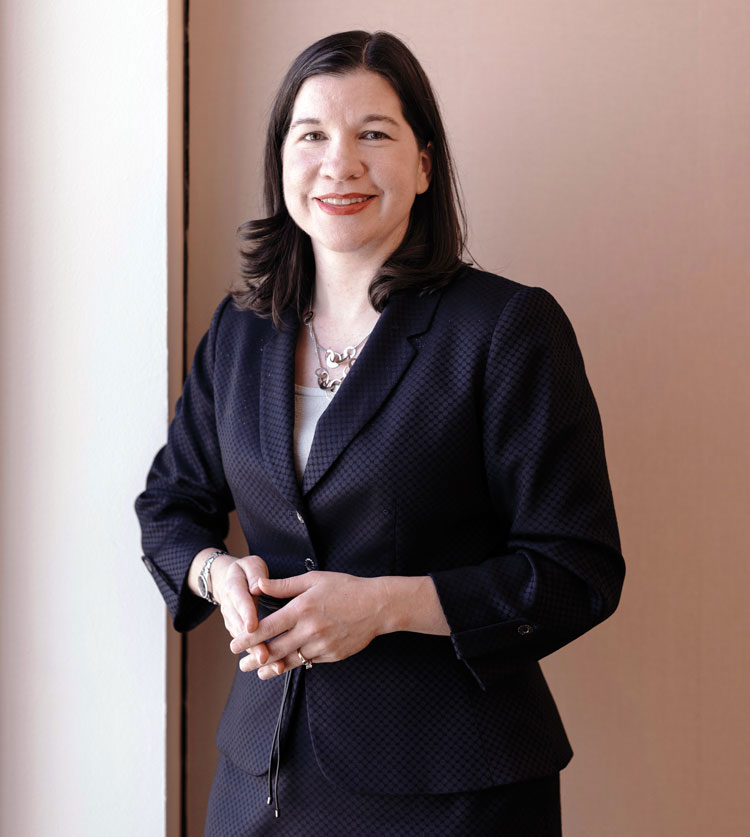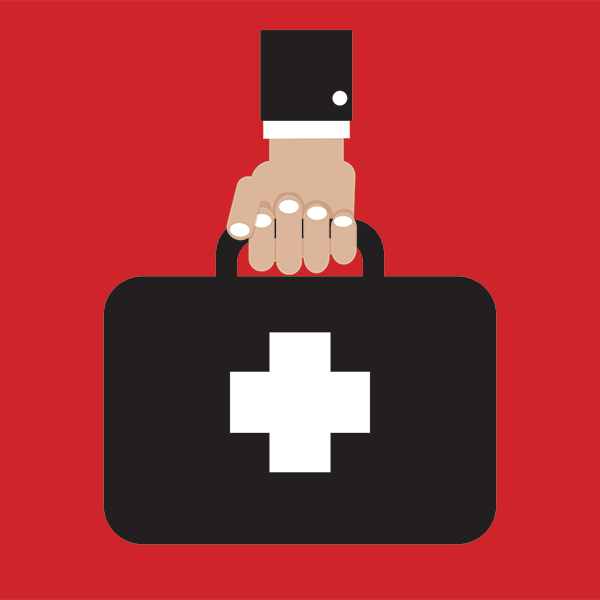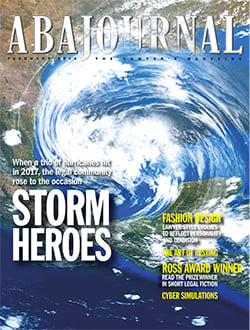Social media unites lawyers to help those in need

Keri Brown. Photo by Todd Spoth.
On the evening of Aug. 29, 2017, Keri Brown got a text message about the growing surge of more than 10,000 people seeking refuge from Hurricane Harvey’s floods at Houston’s George R. Brown Convention Center. She tucked her children into bed at 9:30 p.m. and headed for the ad hoc shelter.
Soon after meeting there with someone from Lone Star Legal Aid, Brown, as the partner overseeing pro bono efforts in Baker Botts’ 200-lawyer Houston office, put out a call within the firm for volunteer lawyers to handle triage for those suddenly forced out of their homes, likely out of work for a while and facing unexpected and untold legal challenges—from damage claims to child custody matters. Quickly, 42 lawyers committed to working shifts over the next two days at the convention center and, as the crowds spilled over, also at the Toyota Center and the NRG Park sports and convention complex.
Brown also posted for help on TL, the Texas Lawyers page on Facebook. In a flash, 38 members of that fast-growing social media community signed up, and she had enough volunteer lawyers.
THE SOCIAL TOUCH
Hurricane Harvey, and then Hurricane Irma two weeks later in Florida, proved to be the coming of age for social media, particularly Facebook and Twitter, as useful tools for court systems and the legal profession, including the private, organically grown Texas Lawyers page, when dealing with such emergencies.
“Within an hour of posting on TL, every shift was filled and I was turning people away, saying ‘Just wait,’” Brown says of the response from the Facebook group, which some believe is unique in the nation. She had joined the social media page—now with more than 8,000 members—two years earlier.
The TL group has become a hive for practitioners in various practices across the state, skewing toward solos and small firms, although attracting some, such as Brown, from bigger firms. Launched in 2014, TL has become both useful and entertaining, with the comfort level raised by Rule No. 1: no judges.
Disaster Response Resources
ABA Resources
• ABA Committee on Disaster Response and Preparedness
Volunteering Opportunities
Florida attorneys can visit the Florida Bar Foundation to find post-storm volunteer opportunities for legal aid and pro bono attorneys, or visit Florida Pro Bono Matters.
North Carolina attorneys can find info on volunteering on the North Carolina Bar's Hurricane Florence page.
South Carolina attorneys can volunteer for the South Carolina Bar's disaster relief legal service hotline by filling out this form.
Not licensed in those states but looking to donate your time or money? Check out ambar.org/DisasterRelief.
ABA Journal Coverage
Hurricane Heroes: From the February 2018 issue
Legal community meets relief challenges after hurricanes Harvey and Irma
ABA mobilizes aid to Puerto Rico and the Virgin Islands
Lessons from Katrina
Social media unites lawyers to help those in need

For our latest natural disaster coverage, click here.
Disaster Helplines
The Disaster Distress Helpline (DDH) is a national hotline dedicated to providing year-round disaster crisis counseling. This toll-free, multilingual, crisis support service is available 24/7 via telephone (1-800-985-5990) and SMS (text 'TalkWithUs' to 66746) to residents in the U.S. and its territories who are experiencing emotional distress related to natural or man-made disasters.
For low-income individuals with disaster-related legal needs, the following phone numbers are available:
North Carolina residents: 1-833-242-3549
South Carolina residents: 1-877-797-2227 ext. 120
Virginia residents:
1-804-775-0808 in the Richmond area, or 1-800-552-7977.
Florida residents: 1-866-550-2929.
A repository for shared knowledge and information in wiki fashion, TL is a trusted source for how-to help and tips from experienced practitioners, for cross-state referrals, advice on the unwritten rules and realities of various courts, and a free-wheeling social gathering spot for political discussions, humor and surveys, such as one for the best way to cook bacon. Consensus: in the oven at 350 degrees for 15 minutes.
“Hurricane Harvey was the first real test for us,” says Andrew Tolchin, an attorney-mediator in the greater Houston area who created the Texas Lawyers page and whose mediation skills gained high marks when applied to disputes there, especially in the politics nook. TL had been adding about seven new members daily, but that rate more than doubled when the storm hit. “My sense is that hundreds, even thousands, of attorneys got a handle on flood law and some peace of mind with access to such timely, on-point information in their Facebook feed.”
When Tolchin, an elected member of the board of directors of the State Bar of Texas, posted a notice about the bar offering a free CLE course on flooding and recovery, it got 200 shares. “I’ve never gotten that many before,” he says. “You’re lucky to get that many for something other than a cat photo.”
One TL member’s cat did get attention. Stranded by flooding, the lawyer posted that she was unable to pick up prescription medicine for her pet. Another member got it and left it at an office near her that she could reach.
Tolchin is not indulging in Texas-size speak when he adds, “It’s maybe the largest such group of just attorneys, maybe from a single state, but I think anywhere.”
Even if it is sui generis, similar Facebook groups likely will develop in other states as the use of social media increases.




